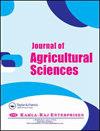Opportunity Cost of Education on Non-Farm Employment in Rural Nigeria
IF 0.7
Q3 AGRICULTURE, MULTIDISCIPLINARY
引用次数: 1
Abstract
Purpose: Returns on education was found to be worker, scale and allocative effects with positive higher payoff to agricultural productivity but its effects on non-farm employment among agricultural households who obtain income through non-farm activities to complement proceeds of agricultural activities are not yet known. Therefore, this study critically investigates the real cost effect of education on involvement in non-farm employment among rural households in South-western Nigeria. Research Method: The study drew a sample of 411 rural farm households through a multi-stage sampling technique from three states in southwest Nigeria and the data obtained were analyzed using the Mincerian equation, logistic model, inverse of Herfindahl index, calculation of expected annual rural income earning and rates of return to schooling. Findings: Results indicate that mean age and education of the rural household heads were 49.9 years and 8.8 years respectively while the household incomes were diversified up to 2.82 level and the non-farm sources contributed an average of 67% of the total income. Education is found to have considerable returns of N4706.30 (US$31.95) to gross household income and an additional year of schooling from other members of the households returns of N12519.90 (US$85) to the households’ income. Education of the household heads increases the probability of farm households participating in rural non-farm employment but the probability of participation reduces with increased level of education of the household heads. Tertiary education has the highest opportunity costs of schooling (N352200.04) per annum and the lowest rate of return to schooling (0.57%) from rural non-farm employment. Research Limitations: The study revealed the real cost of rural farm households’ educational level on the type of non-farm employment and income generated through it. The study presents information on south-western zone of Nigeria. Originality/Value: The practical value of this research is that decline rates of return to higher education reveal the rural non-farm employment being not the prime incentive for rural farm households’ members in obtaining higher education in rural southwest Nigeria. Therefore, implications are drawn for an integrated approach to higher education which may yield agricultural and non-agricultural transformation in rural Nigeria.教育对尼日利亚农村非农业就业的机会成本
目的:研究发现,教育的回报具有工人效应、规模效应和配置效应,对农业生产率具有较高的正向回报,但其对通过非农活动获得收入以补充农业活动收益的农户的非农就业的影响尚不清楚。因此,本研究批判性地调查了尼日利亚西南部农村家庭参与非农业就业的教育的实际成本效应。研究方法:采用多阶段抽样技术,从尼日利亚西南部的三个州抽取411个农村农户作为样本,采用Mincerian方程、logistic模型、Herfindahl指数逆、计算农村预期年收入和学龄回报率等方法对数据进行分析。结果表明:农村户主的平均年龄为49.9岁,平均受教育程度为8.8岁,家庭收入多样化程度达到2.82个层次,非农收入来源平均贡献67%;研究发现,教育对家庭总收入的回报相当可观,为4706.30奈拉(31.95美元),家庭其他成员多上一年的教育对家庭收入的回报为12519.90奈拉(85美元)。户主受教育程度提高了农户参与非农就业的概率,但随着户主受教育程度的提高,农户参与非农就业的概率降低。高等教育每年的就学机会成本最高(N352200.04),而农村非农业就业的就学回报率最低(0.57%)。研究局限:研究揭示了农村农户教育水平对非农就业类型和由此产生的收入的实际成本。该研究提供了尼日利亚西南部地区的资料。原创性/价值:本研究的实用价值在于,高等教育回报率的下降表明,在尼日利亚西南部农村,农村非农就业并不是农户成员接受高等教育的主要动机。因此,对高等教育采取综合办法的影响可能导致尼日利亚农村的农业和非农业转型。
本文章由计算机程序翻译,如有差异,请以英文原文为准。
求助全文
约1分钟内获得全文
求助全文
来源期刊

Journal of Agricultural Sciences
AGRICULTURE, MULTIDISCIPLINARY-
CiteScore
1.80
自引率
0.00%
发文量
0
 求助内容:
求助内容: 应助结果提醒方式:
应助结果提醒方式:


